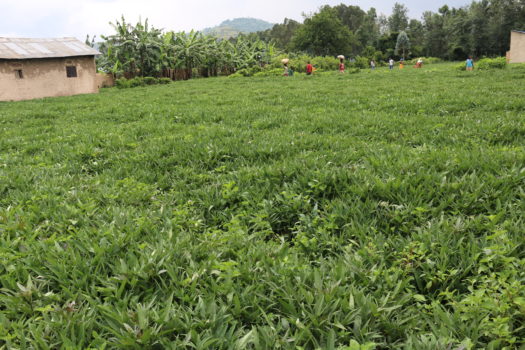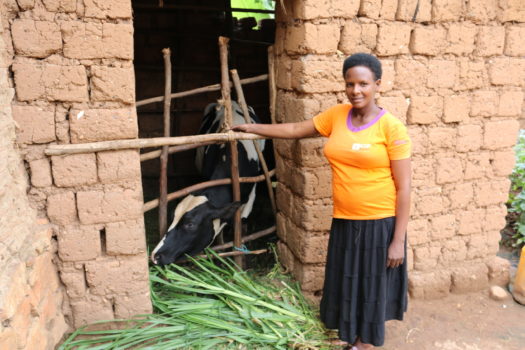According to findings from The Food and Agriculture Organization, women are the backbone of the development of rural and national economies. They comprise 43% of the world’s agricultural labor force, which rises to 70% in some countries. In Africa, 80% of the agricultural production comes from small farmers, who are mostly rural women. Women comprise the largest percentage of the workforce in the agricultural sector but do not have access to and control over all land and productive resources.
After many years of feeling discouraged by her financial and economic challenges Vestine Kambibi knew she had to do something to change the course of her family’s life as well as hers.
Kambibi, a mother of two children is one of the many women who used to think without an education she could not be successful. But despite, the challenges she always had a passion for starting her own business.
Her life changed when she attended one of CIP’s agricultural meetings. There she met a successful decentralized vine multiplier (DVM),-Drocella Yankulije from Muhanga District who was giving a testimony of how being a sweetpotato vine multiplier had changed her life. Kambibi’s curiosity and drive led her to find out more about Drocella and vine multiplication as a business.
“After I contacted Drocella, she gave me an appointment to find her at her home in Shyogwe, Muhanga District. After visiting her, I felt so challenged. This was an elderly widow who has been able to take her children to university, living in a decent house, acquired land and had enough food, all from being a vine multiplier. From that day, I decided, I must do the same work and become successful just like her,” said Kambibi.

A year after, at the beginning of 2017, the 33-year old was ready to take on work as a vine multiplier. On just 0.25 hectares in Gitega cell, Cyarubariro village in Karongi district, Kambibi started Orange-fleshed sweetpotato (OFSP) vine multiplication. From this small land, she has been able to harvest and sell vines three times and has so far earned about 1,350,000 Rwf, around 1,560 USD.
According to the young mother, her life changed. In just a year of doing this work, Kambibi started fulfilling her dreams to do business by opening a charcoal depot in Muhanga where her family stays. She also bought a cow from which she says she gets school fees and milk for her children.

As if this is not enough, Kambibi also acquired 0.40 hectares in Gisiza cell, Gitwa village in Karongi district where she does root production. She now has about 0.65 hectares on which she operates her sweetpotato related business work.
“My only weakness was that I couldn’t see a woman doing something and be successful. I would look down on myself but today, all that is gone,” added Kambibi.
She also joined co-operatives in her area that help her save money and earn interest. This, she explained enables her to run her family’s needs smoothly as well as her personal needs.
Today, she no longer asks for any financial help from her husband. She is a self-reliant woman. “I am proud of myself and why I have achieved,” she added.
Over 10 neighbors have acquired OFSP planting materials from Kambibi and she has educated them on how these varieties of sweetpotato are planted. In addition, she now has confidence in herself as a woman because she sees the ability within her to do something successfully.

The rising entrepreneur concludes saying, she plans to keep buying more land so that in the future, she can multiply vines and produce OFSP roots on a large scale. She extends her appreciation to USAID, CIP, and RAB for giving women like her, opportunities to reposition the fate of their lives.
Kambibi is a testament that when we put women and girls at the center of development, we can see a positive ripple effect across their families, communities, and nations. We have the opportunity to make the world more stable, secure and resilient.